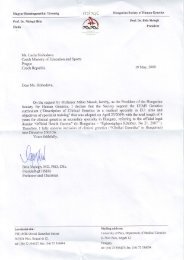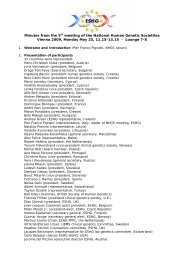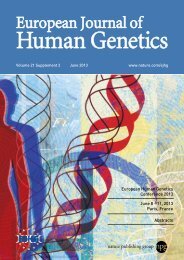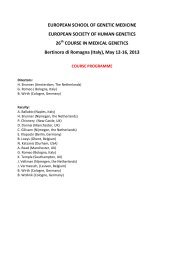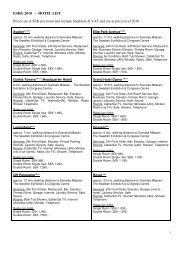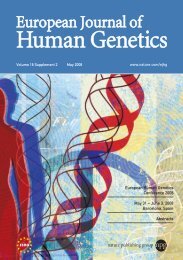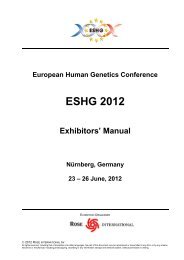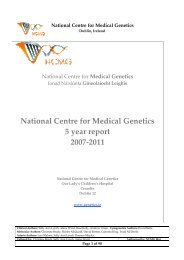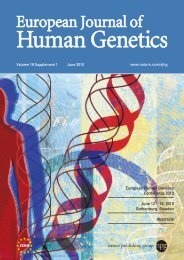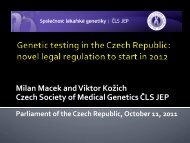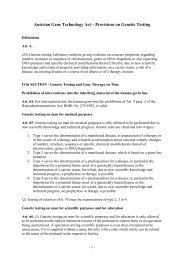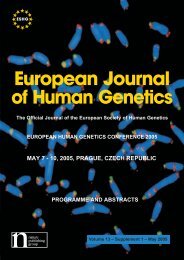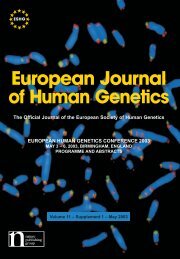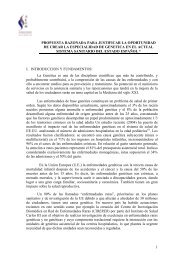2009 Vienna - European Society of Human Genetics
2009 Vienna - European Society of Human Genetics
2009 Vienna - European Society of Human Genetics
You also want an ePaper? Increase the reach of your titles
YUMPU automatically turns print PDFs into web optimized ePapers that Google loves.
Cancer genetics<br />
and MSH2 germline mutation were included in this study. All coding regions<br />
and intron-exon boundaries <strong>of</strong> MSH6 gene were completely analysed<br />
using direct sequence analysis. We detected 5 MSH6 mutation<br />
(4 missense and 1 protein-truncating mutations). Although, missense<br />
variants are labeled as doubtfully pathogenic, clinical data display a<br />
great resemblance between missense-variant carriers and truncating<br />
mutation carriers. We conclude that, in all patients suspected to have<br />
HNPCC, MSH6 mutation analysis should be considered.<br />
P06.147<br />
Evaluation <strong>of</strong> mLH1 and msH2 gene mutations in a subset<br />
<strong>of</strong> iranian families with hereditary nonpolyposis colorectal<br />
colorectal cancer (HNPcc)<br />
M. Salehi1 , S. Amani2 , S. Javan1 , M. Emami1 , M. Salamat1 , M. R. Noori Daloii3 ;<br />
1 2 Isfahan Univ. <strong>of</strong> Medical Sciences, Isfahan, Islamic Republic <strong>of</strong> Iran, Iran Univ.<br />
<strong>of</strong> Medical Sciences, Tehran, Islamic Republic <strong>of</strong> Iran, 3Tehran Univ. <strong>of</strong> Medical<br />
Sciences, Tehran, Islamic Republic <strong>of</strong> Iran.<br />
Hereditary nonpolyposis colorectal cancer is the most common form<br />
<strong>of</strong> hereditary colorectal cancers accounting for 5 to 10% <strong>of</strong> all colon<br />
carcinoma. It is inherited in an autosomal dominant mode and caused<br />
by germline mutations in mismatch repair genes (MMR) chiefly MLH1<br />
and MSH2.<br />
The lifetime risk <strong>of</strong> colon cancer in affected persons is 80%. Screening,<br />
prevention strategies and consequently treatment options will be<br />
improved by understanding <strong>of</strong> the genetic basis <strong>of</strong> this disorder. The<br />
aim <strong>of</strong> this study was to assess mutations in MLH1 and MSH2 genes<br />
in a subset <strong>of</strong> Iranian HNPCC patients.<br />
The families that fulfill Amsterdam criteria were selected as HNPCC<br />
families. Genomic DNA was extracted from the peripheral blood <strong>of</strong> the<br />
samples and germline mutations <strong>of</strong> MLH1 and MSH2 were detected by<br />
PCR-single strand conformation polymorphism (PCR-SSCP) and DNA<br />
sequencing techniques.<br />
Germline mutations were found in 20 cases. Of these mutations, 14<br />
were found in MLH1 and 6 in MSH2 genes thus MLH1 gene had higher<br />
mutation rate than MSH2. Eighteen out <strong>of</strong> 20 detected mutations in our<br />
population were previously reported and two were novel.<br />
Our results demonstrated that mutation range as well as genes involved<br />
in HNPCC is different from one region to other and characterizing<br />
mutations could be very helpful in diagnosis <strong>of</strong> the at risk individuals.<br />
P06.148<br />
screening for germline mutations <strong>of</strong> mLH1, msH2, msH6 and<br />
Pms2 genes in slovenian colorectal cancer<br />
M. Ravnik-Glavac1 , G. Berginc1 , M. Bracko2 , D. Glavac1 ;<br />
1 2 University <strong>of</strong> Ljubljana Faculty <strong>of</strong> Medicine, Ljubljana, Slovenia, Institute <strong>of</strong><br />
Oncology, Ljubljana, Slovenia.<br />
Microsatellite instability (MSI) is present in more than 90% <strong>of</strong> hereditary<br />
non-polyposis colorectal cancer (HNPCC) cases, and is therefore<br />
a feasible marker for the disease. Mutations in MLH1, MSH2, MSH6<br />
and PMS2, which are one <strong>of</strong> the main causes <strong>of</strong> deficient mismatch<br />
repair and subsequent MSI, have been linked to the disease.<br />
In order to establish the role <strong>of</strong> each <strong>of</strong> the 4 genes in Slovenian<br />
HNPCC patients, we performed MSI analysis on 938 unselected CRC<br />
patients and subsequently searched for the presence <strong>of</strong> point mutations,<br />
larger genomic rearrangements and MLH1 promoter hypermethylation<br />
in patients with MSI-high tumours.<br />
We detected 68 (7.2%) patients with MSI-H tumours, <strong>of</strong> which 13 patients<br />
(1.4%) harboured germline defects: 7 in MLH1, 5 in MSH2, 1 in<br />
PMS2 and none in MSH6. Twenty-nine germline sequence variations<br />
<strong>of</strong> unknown significance and 17 deleterious somatic mutations were<br />
found. MLH1 promoter methylation was detected in 56% <strong>of</strong> patients<br />
without detected germline defects and in 1 suspected HNPCC.<br />
Due to the specific absence <strong>of</strong> germline defects in MSH6, we adapted<br />
the HNPCC detection strategy for the Slovenian population <strong>of</strong> CRC<br />
patients, whereby germline alterations should be first sought in MLH1<br />
and MSH2 followed by a search for larger genomic rearrangements<br />
and PMS2 mutations, and when no germline defects are found, mutation<br />
analysis <strong>of</strong> the MSH6 gene should be performed. Our study demonstrates<br />
that the incidence <strong>of</strong> MMR mutations in a population should<br />
be known prior to the application <strong>of</strong> one <strong>of</strong> several suggested strategies<br />
for detection <strong>of</strong> HNPCC.<br />
P06.149<br />
molecular characterization and screening <strong>of</strong> mismatch repair<br />
genes mutations in 667 spanish patients with a familial form <strong>of</strong><br />
nonpolyposis colorectal cancer<br />
E. Sánchez-Tomé 1 , B. Rivera 1 , P. Carbonell 2 , J. Perea 3 , F. Mercadillo 1 , J.<br />
Benitez 1 , M. Urioste 1 ;<br />
1 Centro Nacional de Investigaciones Oncológicas (CNIO), Madrid, Spain, 2 Unidad<br />
de Genética del Hospital La Arrixaca., Murcia, Spain, 3 Servicio de Cirugía<br />
B del Hospital 12 de Octubre, Madrid, Spain.<br />
Introduction: Familial aggregation <strong>of</strong> colorectal cancer (CRC) is estimated<br />
to be approximately 15-20% <strong>of</strong> all CRC. The autosomal dominant<br />
Lynch syndrome (LS) is the most common hereditary CRC (2-7%<br />
<strong>of</strong> all cases). Lynch tumours show microsatellite instability (MSI) due to<br />
aberrant DNA mismatch repair (MMR). The genetic causes are mutations<br />
in MLH1, MSH2, MSH6 and PMS2.<br />
Aims: To characterize the molecular basis <strong>of</strong> CRC aggregation and determine<br />
the minimal frequency <strong>of</strong> LS in a series <strong>of</strong> Spanish families.<br />
Samples and methods: We studied 667 tumour samples belonging to<br />
patients with a suspect <strong>of</strong> a familial form <strong>of</strong> CRC and collected clinical<br />
and familial data <strong>of</strong> the index patients and pathological data <strong>of</strong> tumours.<br />
MSI and/or immunohistochemical expression <strong>of</strong> MMR proteins<br />
was assessed. In cases with MSI and/or lack <strong>of</strong> expression <strong>of</strong> at least<br />
one MMR protein, we screened MLH1, MSH2 and MSH6 genes in peripheral<br />
blood samples for both point mutations and great rearrangements.<br />
Results: 182 cases (27.3%) showed MSI and/or lack <strong>of</strong> the expression<br />
<strong>of</strong> MMR proteins. From these cases we have identified 66 families<br />
(36.2%) with alteration in one MMR gene (Table 1).<br />
MLH1 MSH2 MSH6<br />
Deletereous point mutation 30 19 2<br />
Great rearrangement 1 5<br />
Unknown significant variant 5 3 1<br />
Epimutation<br />
Table 1. Distribution <strong>of</strong> MMR changes<br />
1<br />
Comments: Beside these cases, we identified 26 additional families that fulfilled the<br />
clinical and molecular criteria <strong>of</strong> Familial CRC Type X.<br />
Type <strong>of</strong> mutations and the correlation with clinical and familial data will be presented<br />
in this series <strong>of</strong> families.<br />
P06.150<br />
Family history compared to age as indicator for msi testing<br />
results in a comparable positive predictive value for Lynch<br />
syndrome<br />
N. Hoogerbrugge, P. Manders, C. Kets, A. van Remortele, K. Landsbergen, R.<br />
Willems, D. Bodmer, K. Hebeda, J. van Krieken, M. J. L. Ligtenberg;<br />
Radboud University Medical Center, Nijmegen, The Netherlands.<br />
Introduction: Most colorectal tumours that are due to Lynch syndrome<br />
show high microsatellite instability (MSI-high). Clinical geneticists use<br />
MSI tests when a family history is suspected for Lynch syndrome. To<br />
increase the detection <strong>of</strong> Lynch syndrome, also pathologists select patients<br />
with colorectal or endometrial cancer for MSI testing in case they<br />
are diagnosed younger than 50 years or have a second Lynch associated<br />
cancer younger than 70 years (Gut 2005).<br />
Methods: Index patients under suspicion for Lynch syndrome by a clinical<br />
geneticist (n=885) or a pathologist (n=406) were tested for MSI.<br />
When MSI-high, these patients could opt for germline mutation analysis<br />
in MLH1, MSH2, MSH6 and/or PMS2.<br />
Results: Comparison <strong>of</strong> the group <strong>of</strong> patients under suspicion for Lynch<br />
syndrome by clinical geneticists or pathologists showed a comparable<br />
mean age at diagnosis <strong>of</strong> 49 ± 12 versus 48 ± 13 years (p=0.7), the<br />
percentage <strong>of</strong> MSI tests performed in a colorectal cancer (others mainly<br />
endometrial cancer) was 77% versus 96% (p



